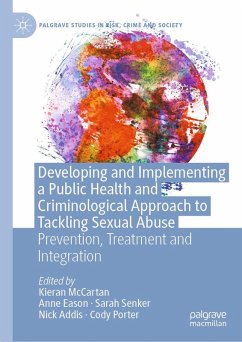
Reimagining Desistance from Male-Perpetrated Intimate Partner Violence (eBook, PDF)
The Role and Experiences of Female Victim-Survivors
Versandkostenfrei!
Sofort per Download lieferbar
104,95 €
inkl. MwSt.
Weitere Ausgaben:

PAYBACK Punkte
52 °P sammeln!
This book describes the findings from a study that aimed to contribute to current knowledge about intimate partner violence (IPV) desistance processes. More specifically, the study examined:The role of female victims/survivors of IPV in male abuser desistance pathwaysFactors associated with desistance and persistence patterns of IPVThe applicability of current desistance theories for explaining the cessation or reduction of IPVFeaturing a number of case studies, this book not only identifies key learnings for the design and delivery of IPV prevention initiatives, but points to areas where desi...
This book describes the findings from a study that aimed to contribute to current knowledge about intimate partner violence (IPV) desistance processes. More specifically, the study examined:
Featuring a number of case studies, this book not only identifies key learnings for the design and delivery of IPV prevention initiatives, but points to areas where desistance frameworks may be enhanced or adapted to improve their relevance to IPV, as well as other offending behaviors.
One of the first of its kind in Australia and internationally, this volume targets domestic, family and sexual violence researchers, criminal careers/desistance researchers and domestic and family violence practitioners and policy-makers.
- The role of female victims/survivors of IPV in male abuser desistance pathways
- Factors associated with desistance and persistence patterns of IPV
- The applicability of current desistance theories for explaining the cessation or reduction of IPV
Featuring a number of case studies, this book not only identifies key learnings for the design and delivery of IPV prevention initiatives, but points to areas where desistance frameworks may be enhanced or adapted to improve their relevance to IPV, as well as other offending behaviors.
One of the first of its kind in Australia and internationally, this volume targets domestic, family and sexual violence researchers, criminal careers/desistance researchers and domestic and family violence practitioners and policy-makers.
Dieser Download kann aus rechtlichen Gründen nur mit Rechnungsadresse in A, B, BG, CY, CZ, D, DK, EW, E, FIN, F, GR, HR, H, IRL, I, LT, L, LR, M, NL, PL, P, R, S, SLO, SK ausgeliefert werden.












